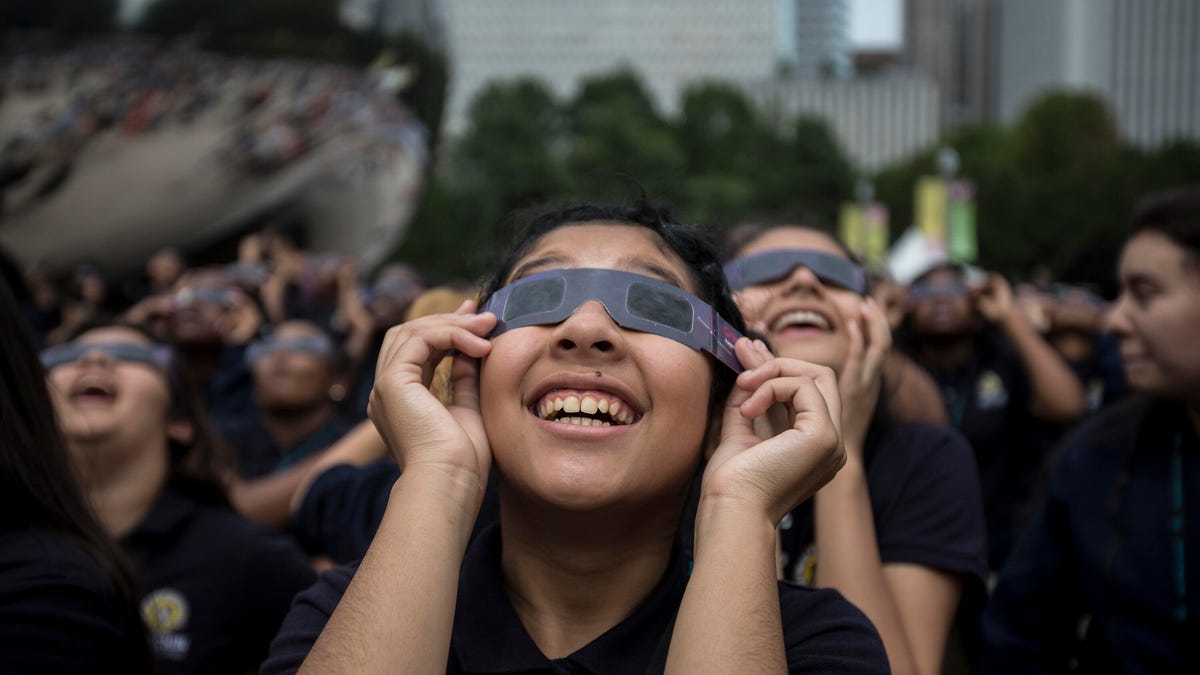Solar Eclipse Eye Protection: How to Tell If Your Glasses Are Safe or Fake Today
Watching the solar eclipse? You don't want to get caught with rip-off eclipse glasses today. What to know.

Special glasses can protect your eyes when watching this year's solar eclipse.
Ready? The total solar eclipse is today -- April 8, 2024. This eclipse, which will be visible across North America, is the last one in the continental US for almost 20 years. If you're in the path of totality today or outside the area and viewing a partial eclipse, you're going to need solar eclipse glasses to protect your eyes while staring at the sun.
Solar eclipse glasses are special glasses that block out the most dangerous parts of the solar spectrum for human eyes. When you look through them, the sun should appear as an easy-to-view yellow-orange circle. Use them to watch the entire eclipse, but be aware that these glasses will block out all light -- so you won't want to use these glasses while walking, driving or doing anything besides eclipse viewing.
Read more: Need Free Solar Eclipse Glasses? Stop by Warby Parker
However, bad actors may sell eclipse glasses that don't actually do anything to protect your eyes from the sun. So, if you're viewing the eclipse in person today, you're going to want to make sure that your eyes are really being protected. Read on to find out about the steps you can take to make sure your solar eclipse glasses are legit.
For more, here's how Solar Snap can help you take great eclipse photos and why you should download your Google Maps route before you travel to see the eclipse.
Check the ISO number of your eclipse glasses
According to the American Astronomical Society, a real and safe pair of solar eclipse glasses should be labeled with ISO 12312-2 (sometimes written in more detail as ISO 12312-2:2015), which is an international safety standard that denotes the glasses reduce visible sunlight to safe levels and block UV and IR radiation.
Check the list of reputable eclipse glasses vendors
However, fake glasses may also be labeled as being compliant with ISO 12312-2 because, as a general rule, people are greedy, selfish and not to be trusted. To double-check the veracity of your eclipse glasses' ISO claims, you can see if the vendor from which you purchased the shades is trustworthy in the eyes of the AAS. See its list of Reputable Vendors of Solar Filters and Viewers. Really, the safest thing you can do is pick a vendor from the above list and purchase your glasses from there, so there are no concerns about counterfeits and fakes when it comes to your eye safety.
The list also includes big-box retailers and chains where you can grab AAS approved eclipse glasses, including Warby Parker, which is giving glasses away for free starting April 1. Personally, I got my glasses from a trusted local museum, but I'll still be checking mine to make sure that I'll be protected.
In assembling its list, the AAS checks to make sure a manufacturer earned its ISO rating with proper, labs-based testing. It also asks manufacturers for their authorized resellers and resellers for their manufacturers. If the vendor of your eclipse shades is listed, then you are safe. But the opposite isn't necessarily true. If your vendor isn't listed, it doesn't necessarily mean they are slinging counterfeits. It just means the AAS hasn't checked them out or hasn't been able to track everything down.
So, what are you to do if your vendor isn't on the list? Perform an eye test.
How to test your solar eclipse glasses
If your mystery pair of eclipse glasses look pretty darn dark, that's a good place to start start. You should not be able to see anything through them except the sun itself or something similarly bright.
What's something as bright as the sun you can use as a test? The AAS suggests you check sunlight reflected off a mirror or a shiny metal object. If sun is behind the clouds or on the other side of the earth when you want to test your glasses, you can use a bright-white LED such as the flashlight on your phone or a bare lightbulb. The reflected sunlight or bright, white, artificial light should appear very dim through a safe pair of eclipse glasses. If you can see light behind a lamp shade or a soft, frosted light bulb through the glasses through your eclipse glasses, then you know that these glasses aren't strong enough to stare safely at the sun.
When staring at the sun through safe solar eclipse glasses, the sun should appear comfortably bright like the full moon, according to the AAS. If your eclipse glasses are uncomfortable to use, that is also a good sign that they might not be legitimate.
For more, here's how to buy last-minutes solar eclipse glasses and where you can get a free pair of eclipse glasses.



